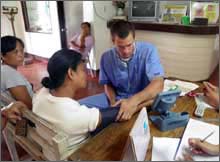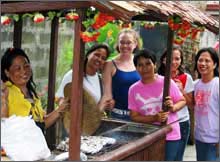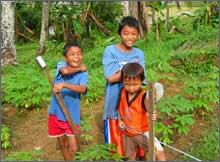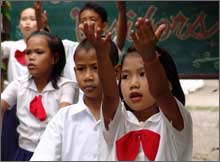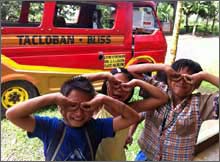The Philippines
The Philippines is an archipelago of over 7000 islands that stretches from South China to the northern tip of Borneo. The country has over a hundred ethnic groups and a mixture of foreign influences which have molded a unique Filipino culture. Its diverse ecosystems along with its even more diverse cultural history make it one of the most fascinating destinations in the world. A home to lively festivals, friendly people, cities and villages, beautiful beaches, tropical rainforests, volcanoes, waterfalls, and coral reefs teeming with life, the Philippines is truly a unique jewel in the South China Sea.
All ELI programs are based in Tacloban City on Leyte Island in the Visayas region of the Philippines. While travel to some of the southern islands, especially Mindanao, is considered dangerous, Leyte, like most of the Philippines is safe for travelers. The islands offer a laid back pace of life. The culture is a fusion of indigenous Austronesian, Hispanic, Chinese, Islamic, and American influences. Filipinos are well known for being some of the friendliest and most hospitable people on the planet. Participants will have the unforgettable experience of living with a local host family in addition to becoming a part of the community and working on projects started by community members.
Volunteer & Internship Programs
-
Youth Programs
Youth Programs
Dumpsite Project: A sad fact of many cities throughout the developing world is that there is a certain portion of the population that is forced by various circumstances to actually live in the local dump. These people generally scrounge for food and any items which can be sold for basic sustenance. In Tacloban City, there are whole families that live in these conditions. The Dumpsite Project, started in 2005, collaborates with local and governmental organizations to help alleviate the problem. The primary goal of the program is to draw the children away from the dumpsite and enroll them in school. This helps provide them to opportunity to create alternative forms of income for themselves and their families. The project also helps to provide basic health care and even occasional day camps in sports or the arts. Questions? Click here
Special Education: School children with disabilities and impairments require specialized education. Even in developed economies funding can be scarce. As a volunteer, you will mentor the children and provide assistance to teachers. This project requires volunteers with experience in working with deaf, blind, and autistic children. To work with the deaf children, you must have knowledge of International Sign Language. Questions? Click here
Coach Basketball: Basketball is by far the most popular sport in the Philippines, especially among youth. It does not require complex or expensive equipment and can be played virtually anywhere. During the months of April, May, and June, this project is looking for volunteers who are willing to teach basketball skills to local youth. The children come from a wide variety of backgrounds and skill levels. These basketball camps provide a healthy, positive outlet for youth in the community. Questions? Click here
Orphanage: One of the major concerns in the Philippines, as in many developing countries, is population. Both the government and NGO's work to establish orphanages to help give a home to children that have been abandoned or abused. ELI works with several different orphanages throughout Tacloban City and the surrounding area, helping the often overworked staff to keep the facilities running. Orphanages rely on the assistance our volunteers provide to ensure that they can accept as many children as possible. Each orphanage houses anywhere between 20 and 100 children. All of the children come from poor families and many have suffered from malnutrition or neglect. The children thrive on the attention and love our volunteers can share with them. Volunteers do not necessarily need care giving experience, just energy, enthusiasm, an open mind and an open heart. Orphanages often operate with very limited resources and volunteers must possess a high level of creativity and flexibility. Questions? Click here
Street Kids: It is a very common sight in the Philippines to see children living on the streets. Most children who have settled on the streets have families of their own but turn to the streets in search of food. Glue sniffing, known as "rugby" in Tacloban, is a common addiction amongst the street children who turn to this drug to suppress their hunger pains. ELI works in conjunction with the social workers to help provide these children with the resources they lack in life, such as compassion, trust, love, and food. Volunteers are not required to have any formal training or certification, but must be at least 20 years old and commit to volunteering for at least 4 weeks. Questions? Click here
Apply Now
After you fill out the application form on our website, our applications adviser will be in touch to help you with the next steps.
-
Health & Nutrition
Health & Nutrition
Rural Community Health Clinic: A great way to get some medical experience while you travel is to participate in the rural health clinics in communities just outside of Tacloban City. Volunteers can shadow and observe the medical practices in the free facilities for the indigenous people in these rural communities. Each clinic has just one doctor to serve the entire community in multiple barangays so the assistance of medical volunteers is greatly needed. Volunteers will assist the doctor and get hands-on practice working and interacting with the patients. In addition, they will learn about the health care conditions here in the Philippines. Volunteers must currently be studying or have finished studying in the health industry. Questions? Click here
Nutrition Project: One of our most popular projects in the Philippines, our Nutrition Project works in conjunction with the City Nutrition Office to both evaluate and improve the level of nutrition among local families in and around Tacloban City. In areas where malnutrition rates among children are shockingly high, the need to pull as much nutrition as possible out of limited food sources is clear. Volunteers work with health professionals to take nutrition statistics in local villages, and then help to implement plans to improve the situation on the ground. Participants may do anything from simply weighing and playing with children, to teaching informal nutrition classes, to developing projects and designing new community health plans. This is a great project for public health or nutrition students or anyone else who simply has an interest in the broader field of community health. Questions? Click here
Apply Now
After you fill out the application form on our website, our applications adviser will be in touch to help you with the next steps.
-
Women's Programs
Women's Programs
Shelter for Girls: The local welfare office in Tacloban City operates a residential girl’s shelter. The home cares for and helps empower female youths, many of whom came to the home from government orphanages or were victims of sexual or domestic abuse. The center provides shelter until the girls can safely join their respective communities. The home has its own staff, but due to workloads and staff limits, the girls do not always receive the necessary attention that they should; volunteers help to bridge this gap. Four week minimum time commitment required. This placement accepts female volunteers only. Questions? Click here
Women's Empowerment: The women’s empowerment is a residential center operated by the local social welfare office to help empower women who are victims of domestic abuse. Female volunteers work with the center to assist in the daily operations, providing emotional support and informal education for the women. Volunteers will form close bonds with the women and work side by side with existing house parents and social workers. Participants with experience in psychology and counseling are especially desired for this placement. Four week minimim time comittment required. This placement accepts female volunteers only. Questions? Click here
Apply Now
After you fill out the application form on our website, our applications adviser will be in touch to help you with the next steps.
-
Teaching
Teaching
Teach English in Rural Schools: Throughout the Philippines there is a large emphasis on learning the English language. You will find that, wherever you go, most people will be capable of speaking a bit of English. Children begin taking English courses at a very young age. Unfortunately, this also represents an even sharper divide between urban communities and the relatively poorer rural ones. Without the English education standard in more urban schools, children from rural neighborhoods have a great disadvantage. Volunteer teachers travel out to the more rural schools and help provide the English education to give these children more equal footing. Questions? Click here
Deaf Education Project: Children with physical and developmental disabilities often find it more difficult to succeed in a school system that caters to fully abled children. Volunteers in this project work with a local high school that works with deaf children, mentoring the children and assisting the teachers to lead classes in a variety of subjects. Volunteers with this project must have experience working with deaf children. International Sign Language experience is especially desired. Questions? Click here
Apply Now
After you fill out the application form on our website, our applications adviser will be in touch to help you with the next steps.
-
Community Development
Community Development
Community Center: Volunteering with the VFV Community Center provides one of the most open venues for volunteers. The Community Center offers many different services to the surrounding community and volunteers are free to participate in whichever ones pique their interest or match their skill set. The Center handles literally dozens of community based programs in everything from day care, to job skills courses, to “mothers clubs” and outreach programs. Questions? Click here
Rehabilitation Center: The relatively high poverty rate in the Philippines can lead to many problems. In some cases this manifests itself in an increasing crime rate, especially among boys and young men who turn to petty theft as a means of obtaining money. ELI works in conjunction with social workers to assign male volunteers to work with boys and young men at the Regional Rehabilitation Center for Youth in the Tacloban suburb of Tanauan. The center houses up to 50 boys at a time who have committed crimes as minors and are either waiting for their trials or are working to rehabilitate and enter the work force as responsible members of the community. Volunteers don’t necessarily need experience or formal training, but should be enthusiastic and exhibit a high level of initiative. This placement accepts male volunteers only. Questions? Click here
Construction: One way to provide a very tangible benefit to the local community is to become involved in a construction project. By actually hammering nails and putting up walls, volunteers get to directly see the improvement in the lives of members of the local communities. Participants work with trained construction workers to build schools, orphanages, and homes in and around Tacloban City. Questions? Click here
Apply Now
After you fill out the application form on our website, our applications adviser will be in touch to help you with the next steps.
Cost & Details
-
Cost - Philippines
Length of Program Program Fee 2 Weeks US $880 3 Weeks US $990 4 Weeks US $1115 5 Weeks US $1240 6 Weeks US $1365 7 Weeks US $1490 8 Weeks US $1615 9 Weeks US $1740 10 Weeks US $1865 11 Weeks US $1990 12 Weeks US $2115 Programs require at least a two week commitment with a 6 month maximum. Every additional 2 weeks costs $170.
Application Fee: $200
The application fee is a separate administrative charge for all programs. It does not apply to the program fee. (Please see our application fee refund policy here)Credit card payments: Payment by credit card will be assessed a 3.5% surcharge. This is the fee that we will be charged for the transaction. Contact us about alternative forms of payment.
Apply Now
After you fill out the application form on our website, our applications adviser will be in touch to help you with the next steps.
-
What's Included/What's Not
Program Includes
*Airport Pickup and Drop-off
*Accommodation
*Orientation Upon Arrival
*Volunteer Work Placement
*Activities
*In-country coordinator available 24/7Program Does Not Include:
*Round-trip Airfare
*Required Travel and Medical Insurance
*Visa FeesApply Now
After you fill out the application form on our website, our applications adviser will be in touch to help you with the next steps.
-
Accommodations
Accommodations
Volunteers in the Philippines stay with local host families. ELI truly believes that this is the best way to fully immerse in another culture and get the most from an international experience. All families are carefully screened and are well-respected members of the community with at least one family member who speaks English. Participants will have either a private or shared bedroom with secure storage (volunteer must provide own padlock). Bathrooms are shared with the host family. Volunteers will be provided with breakfast and dinner daily.
Apply Now
After you fill out the application form on our website, our applications adviser will be in touch to help you with the next steps.
-
Start Dates
Start Dates
The start dates for the Philippines programs are very flexible. We ask that participants arriving in December not arrive between December 23 and January 3 in order to allow our coordinator and staff to spend the holidays with their families. There are lots of holidays throughout the year, be sure to check out the 2018 Holiday Calendar.
-
Notes & Useful Links
Travel Insurance
Travel insurance is not included in the program fee. We prefer to let participants decide what kind of coverage they need.



